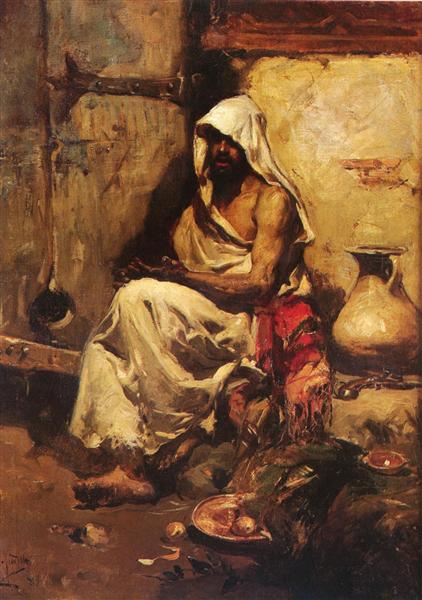Description
In the work "An Arab examining a gun" by Joaquín Sorolla, carried out in 1881, an atmosphere of deep contemplation is displayed, marked by the interaction between the central character and the object he holds in his hands. Sorolla, a master Of color and light, it manages to capture not only the dignity of the subject, but also a scene that promotes a reflection on cultural identity and implicit violence inherent in the armament.
The composition of the painting focuses on an Arab man, elegantly dressed, who is in an environment that is little communicated in terms of landscape, but that accentuates the figure and the weapon that examines. The attention is immediately directed to the gun that holds in his hand, a symbol of power and danger. The use of color is particularly remarkable; The earthly tones and vibrant nuances of the character's locker room contrast with the cold metal of the weapon in a duality that combines the human and the war.
The Arab's face, with his contemplative gaze, invites the viewer to question what he is thinking at that time. Is it a moment of reflection on violence, an examination of a war tool, or perhaps a representation of the intersection between the cultural and the war? Sorolla is able to manifest this tension through the character's expression, which is serene but loaded with a heavy introspection.
Through the mastery of Sorolla in the representation of light, the folds of man's clothing subtly capture the reflexes, while the bottom, almost indefinite, does not distract the attention of the spectator from the interaction between man and the object . This demonstrates not only the artist's technical ability, but also his deep understanding of human psychology and how environments can influence the emotional state.
It is relevant to point out that Sorolla's work, although often celebrated by his focus on scenes of everyday life and nature, also addresses more complex issues. "An Arab examining a gun" represents one of those interactions between the everyday and the rough, echoing an era in which the relations between the West and the East were being reconfigured.
This painting is part of a broader context of works from the late nineteenth century that explore oriental themes, often from the perspective of European artists who sought to portray a romantic or exotic vision of the "other." Sorolla, through its distinctive approach, provides a perspective that, although it could be considered aligned with orientalism, also transcends towards a more intimate and personal observation about the human being.
Although the work itself is not as prolific in terms of recognition as others of its repertoire, it is located at a key moment of its career where it begins to consolidate its style, characterized by a rich palette and a dedication to capture of light. In the context of its global production, "an Arab examining a gun" remains as a will of his ability to intertwine elements of cultural identity with the complex narrative of modernity.
In conclusion, this work stands out as a reflective study on the interaction between an individual and a symbol of violence, explores the sorolla ability to illustrate the essence of the human being and its cultural context, as well as its great domain of the pictorial technique. Through an attentive look and critical thinking, spectators can discover the depth of this painting and its relevance in the work body of an artist who remains fundamental in the dialogue of contemporary art.
KUADROS ©, a famous paint on your wall.
Hand-made oil painting reproductions, with the quality of professional artists and the distinctive seal of KUADROS ©.
Art reproduction service with satisfaction guarantee. If you are not completely satisfied with the replica of your painting, we refund your money 100%.

